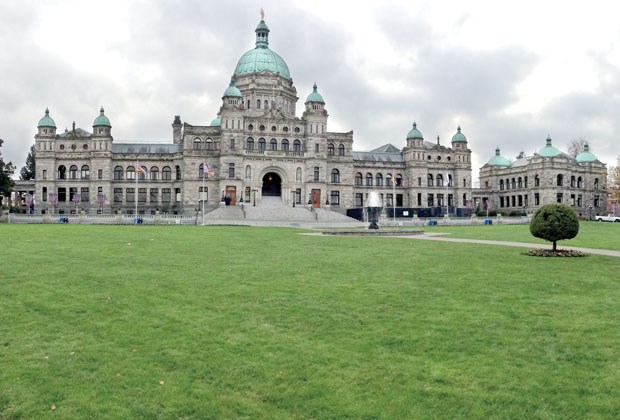The gathering of the NDP faithful at this past weekend’s biannual party convention revealed a party that has settled comfortably into government and is hungrily eying the next election.
Even though trouble signs abound – a deteriorating economy, a forest industry in crisis and a sudden spate of labour disputes – the New Democrats I talked to seemed confident (but not overly confident) about their political future.
A big reason for that quiet confidence is their leader, Premier John Horgan. He gave a long, somewhat rambling keynote speech that patiently went through all kinds of platform commitments that have been kept.
It was a classic mid-mandate speech that was well received. No fireworks or emotion of the kind you might hear on the eve of an election, rather a just-the-facts-ma’am recitation of accomplishments (oh, and by the way, after the speech Horgan received a 96.4 per cent vote of support on his leadership).
He also tried out a routine aimed squarely at his chief opponent, B.C. Liberal Leader Andrew Wilkinson. Horgan sarcastically mocked him as a “regular guy” who he said romanticizes the renting life, protects gas companies and holds fundraisers at tony yacht clubs.
I have a feeling this was setting the stage for the theme of part of the NDP’s strategy in the next election campaign: painting Wilkinson as a remote patrician out of touch with real people. In other words, the precise opposite of a “regular guy.”
Wilkinson is not well known yet and he has to be aware of the political adage that says you had better define yourself before your opponent does. At least now, he has a clue how the NDP will be coming after him.
Meanwhile, while more than 600 convention delegates heard speeches and debated all kinds of resolutions, about 300 teachers gathered in literally the next room to, among other things, blast the NDP government for its position in contract talks with the BC Teachers’ Federation.
However, this was a telling moment as well. Here you had hundreds of teachers – all clad in red T-shirts, which made their presence quiet noticeable – literally (and politely) in the face of New Democrats as they left the convention centre, yet there was an almost blasé response from the side being attacked.
At one point, I was standing outside the convention centre with about two dozen of the red shirted teachers, getting ready to interview BCTF president Teri Mooring. Who should walk through the crowd at that moment than none other than a smiling Carole James, the finance minister in charge of teacher contract negotiations.
To say she seemed unperturbed is a serious understatement. James knows how difficult – if not outright impossible – it will be to achieve a negotiated settlement with the teachers’ union, but I don’t think she’s losing much sleep over it.
The NDP caucus and cabinet have slowly but surely got their heads around the inevitable difficulties that come with governing, and the necessary compromises and position changes that come with it. This means that supposed “friends” from the years in opposition (such as the BCTF) may turn on you, but that goes with the territory.
For years, NDP conventions were somewhat gloomy affairs of political activists seemingly stuck forever in opposition, frustrated by a chronic inability to affect change. The convention after the 2017 election win was understandably mostly a celebratory affair of people not really sure they were actually in power for the first time in 16 years.
This year’s gathering reflected the reality that the party seems to have accepted: that not everything can be done at once, and that change – while happening quickly on some fronts – is often a long-term game.
On the eve of the convention, Horgan told reporters he figures his party has achieved about 80 per cent of its commitments, and he is confident the remaining 20 per cent will be successfully dealt with before the next election.
Maybe. Maybe not. But either way, the NDP finds itself in a pretty good spot less than two years out from the next vote.
Keith Baldrey is chief political reporter for Global BC. [email protected]
What are your thoughts? Send us a letter via email by clicking here or post a comment below.



